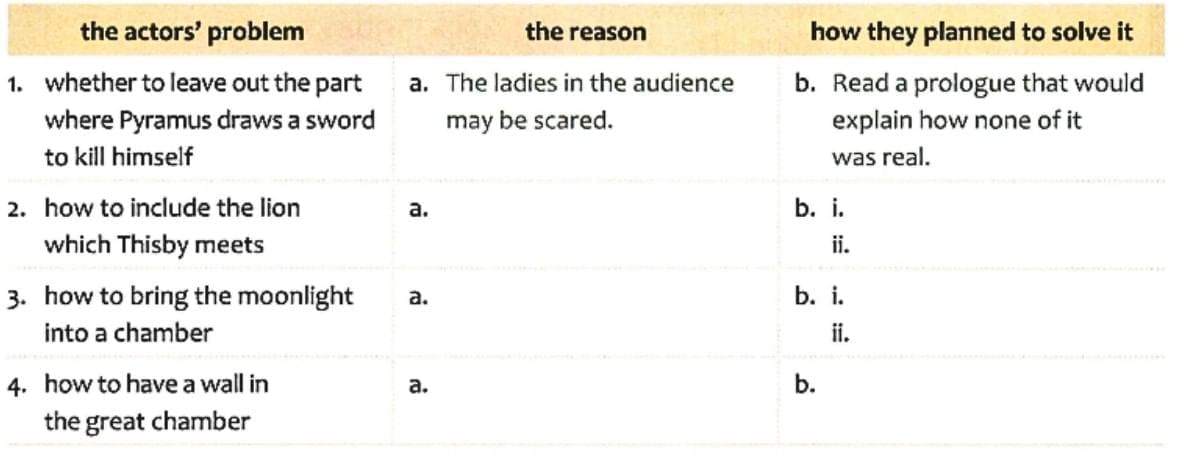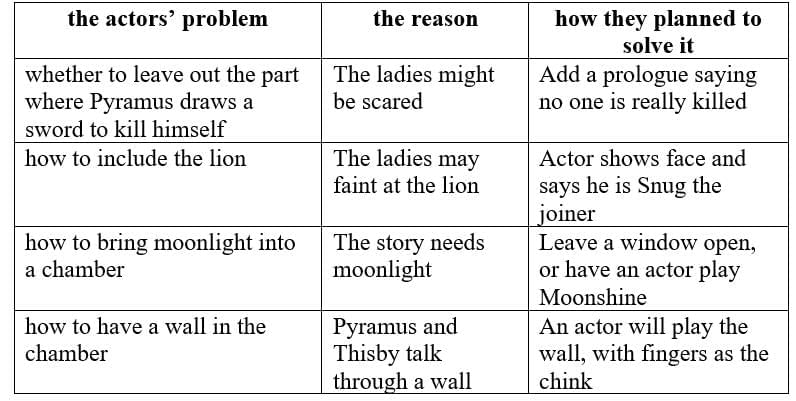Textbook Solutions: The Play (play) | Gul Mohar Class 7: Book Solutions, Summaries & Worksheets PDF Download
| Table of contents |

|
| Before You Read |

|
| While Reading |

|
| Understanding the Text |

|
| Appreciating the Text |

|
Before You Read
Q. Dramatic irony is a technique that a writer uses in a story. In such a story, the reader knows something the characters in the story do not. This means that sometimes the importance of a character's words or actions is clear to the reader but not known to the characters. How does this—1. add suspense to the story?
2. make the story funny?
Why do you think a writer might choose to write a story this way?
Ans: (1) It adds suspense as the audience already knows the truth, and they eagerly wait to see what the characters will do when they finally realise it.
(2) It makes the story funny because the audience enjoys watching characters make silly mistakes without knowing the truth.
A writer may choose this style to keep the audience entertained with tension, surprise, and humour.
While Reading
Q1. The artisans are not used to acting in a play—nor have they watched one. We know this because ...Ans: They confuse acting with real life. They want to add a prologue to explain that the sword and lion are not real, and even suggest the actor reveal his true identity on stage.
Q2. What do you think the artisans think of the ladies? Why do they think this? (Remember, they are talking about ladies from old, rich families.)
Ans: The artisans think the ladies are very delicate and might faint at the sight of violence or a lion. They believe this because noblewomen in those times were seen as soft and sensitive.
Q3. Do you think the ‘person of Moonshine’ will confuse the audience? Why do you think so?
Ans: Yes, it will confuse the audience, because a man carrying a bush and lantern to show moonlight looks absurd. This silliness adds to the comedy and makes the play more entertaining.
Q4. Puck's attitude towards the artisans is one of … This might affect what happens next because …
Ans: Puck feels amused and mischievous about the artisans. This affects the story because he decides to prank them by turning Bottom’s head into that of a donkey, creating chaos and laughter.
Q5. What has Puck done to Bottom? Why do you think he chose to do this?
Ans: Puck turned Bottom’s head into that of a donkey. He did this because Bottom was boastful, and the prank made him look like a fool, which perfectly matched his proud and silly behaviour.
Q6. Bottom is using the word 'ass' here to mean 'fool.' But the writer also means something else—what is it? Does this help maintain the tone of the play?
Ans: It also means a donkey. Yes, the pun maintains the comic tone, as Shakespeare often used such clever wordplay to keep the audience amused and entertained.
Q7. What has happened to Titania?
Ans: Titania, under the magic flower’s spell, wakes up and instantly falls in love with Bottom, even though he has a donkey’s head. This shows the silly power of enchanted love.
Q8. Say—
a. what Bottom would have thought as he heard Titania's speech in paragraph 47.
Ans: Bottom probably thought Titania was praising his singing and wisdom. He did not realise she was enchanted and simply enjoyed her sweet words as a compliment to himself.
b. how you would have reacted.
Ans: I would be shocked and amused to see a fairy queen fall in love with such a ridiculous figure. It would feel both surprising and funny at the same time.
Q9. The contrast between the artisans and the fairies is … This adds to the comic effect because …
Ans: The artisans are clumsy and foolish, while the fairies are elegant and magical. This contrast creates comedy by showing ordinary people mixed with magical beings in absurd situations.
Q10. The joke that has been played is cruel to—
- Titania
- Bottom
- both Titania and Bottom
Say why?
Ans: The joke is cruel to both. Titania is humiliated by loving a fool, and Bottom becomes a laughingstock with a donkey’s head. Both are mocked by Puck’s prank.
Understanding the Text
A. Complete this table about the play that the men were rehearsing.

Ans: 
B. Answer these questions.
Q1. Where did the actors meet for the rehearsal? Why did they think it was a convenient place? (para 2)Ans: They met in a forest clearing. They thought it convenient because it was green, open, and quiet like a natural stage, perfect for rehearsal.
Q2. "A stranger Pyramus than e'er played here." (para 30)
a. Who was Puck referring to?
Ans: Puck was referring to Bottom.
b. What mistake did the actor make?
Ans: Bottom confused the word “odours” with “odious,” which made his speech sound ridiculous and funny.
Q3. "I see their knavery: this is to make an ass of me; to fright me, if they could. But I will not stir from this place, do what they can:" (para 42)
a. Who is the speaker? Why did he think the others were making an ass of him?
Ans: The speaker is Bottom. He thought the others were joking to scare him.
b. Was the speaker frightened?
Ans: No, he insisted he was not afraid and tried to act brave.
c. What did the speaker decide to do? Why?
Ans: He decided to stay and sing loudly, to show he was fearless and could not be tricked.
Q4. Puck affected Bottom both directly and indirectly. How did he do that? (paras 35–43)
Ans: Directly, Puck gave Bottom a donkey’s head. Indirectly, this scared the other artisans, who ran away in fear, leaving Bottom alone and confused.
Q5. "Methinks, mistress, you should have little reason for that: and yet, to say the truth, reason and love hardly keep company together now-a-days;" (para 44)
a. Who was speaking to whom? When?
Ans: Bottom was speaking to Titania after she confessed her love.
b. “… you should have little reason …” for what?
Ans: For loving him.
c. What did the speaker mean by “reason and love hardly keep company”?
Ans: He meant love is often blind and not logical; it does not follow reason.
Q6. "Be kind and courteous to this gentleman;" (para 53)
a. Which gentleman does this refer to?
Ans: This refers to Bottom.
b. How should Titania's fairies be kind and courteous to him?
Ans: They should dance around him, serve fruit, bow, and obey his wishes as their queen ordered.
Q7. This is a story involving a powerful emotion that is made humorous by its comical presentation.
a. What is the powerful emotion?
Ans: The powerful emotion is love.
b. Why has the writer chosen to make such a story a comedy?
Ans: To show how love can be blind and foolish, while also entertaining the audience with humour and irony.
Appreciating the Text
Q1. Which of these contribute to the comic element of this play?a. the odd decisions that the actors take about how to stage the play
b. the reactions of the audience to the play
c. the pranks played by Puck
d. the contribution to the play made by Puck
Ans: (a) Odd decisions by actors
(c) pranks by Puck
(d) Puck’s contribution to the play.
These made the story silly and entertaining.
Q2. Read para 47 aloud. How and why has the writer made Titania's speech particularly musical?
Ans: The speech uses rhythm, repetition, and soft sounds. It sounds dreamy and magical, showing Titania is enchanted and deeply under the spell of love.
Q3. The characters and incidents in this text are of three types—the real, the fictional, and the magical. Ans:
Ans:
- Real:The artisans like Bottom, Quince, and Snug rehearsing in the forest.
- Fictional: The play within the play—Pyramus and Thisby’s tragic love story.
- Magical: Puck’s prank, Titania’s enchantment, and the fairies’ presence.
|
28 videos|56 docs|17 tests
|
FAQs on Textbook Solutions: The Play (play) - Gul Mohar Class 7: Book Solutions, Summaries & Worksheets
| 1. What is the significance of plays in literature and education? |  |
| 2. How can reading a play differ from watching a play performed? |  |
| 3. What are some common themes found in plays for younger audiences? |  |
| 4. How do plays reflect cultural and historical contexts? |  |
| 5. What skills can students develop through participating in play performances? |  |
|
28 videos|56 docs|17 tests
|













